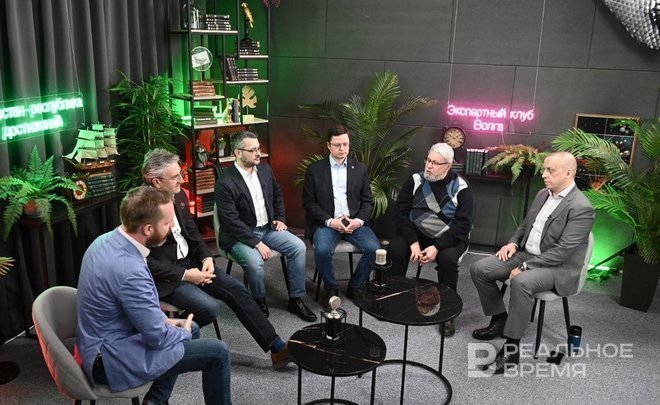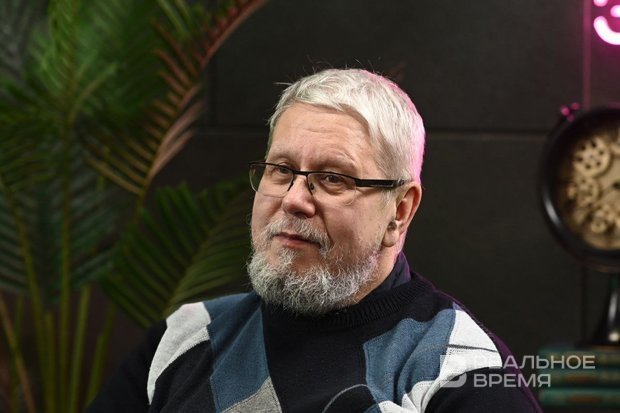‘Russia now has a unique opportunity to build its own education and knowledge system’
Participants of the Volga Expert Club discussed the state of modern Russian science, its development taking into account international sanctions and the special military operation, as well as the acquisition of intellectual sovereignty

The current year in Tatarstan has been declared the Year of Scientific and Technological Development. The republic is among the leaders in the country in many areas. Science is no exception. The number of young scientists in Tatarstan is 4.5 thousand, which is 60.4% of their total number in Russia. They are engaged in research in the field of extraction and processing of raw materials, chemical and information and telecommunication technologies, energy, agrobiotechnology and food security, medicine and health saving. And they achieve certain successes. However, the current geopolitical situation, anti-Russian sanctions, which block specialists from accessing the achievements of global science and the opportunity to communicate with colleagues from the world scientific community, cannot but affect their activities, the participants of the regular meeting of the Volga Club agreed.
Science at a crossroads
Sergey Pereslegin, a Physicist, head of Laboratory RK 39 research group, believes that now Russian science is facing a choice of a further path.

“Either it is trying to fit into one or another existing scientific formats, ok, it did not work with the West, but there are scientific formats of, for example, BRICS, where you can also fit in and get scientific globalisation. This is one possible move. The second is to clearly accept for yourself that science is not global, that its globalisation reduces the cognitive diversity of the world, and this is the possibility of replicating the same scientific mistakes. In this situation, it is possible to create your own formats. Both paths contain risks. In the first case, it turns out to be an appendage of someone else's thinking. The second is to get something fundamentally broken, and even become the laughing stock of the whole world," the scientist argues.
At the same time, in his opinion, Russia now has a unique opportunity to build its own education system and its own cognition system based on its own cognitive code without regard to Western models.
“This is an opportunity that our opponents do not have. For a very simple reason, they have so far remained within the framework of global science and thus a whole set of conventions and agreements, written and unwritten, which cannot be violated. We have been thrown out of this space. This means that all existing agreements have lost their meaning for us. It's a chance, but also a risk... But the situation of the country involves a risk in any strategy," explains Pereslegin.
Theory for practice
According to him, the risk also lies in the shift of scientific research towards technology to the detriment of basic research.
“Any war or threat of war gives an incentive to the development of technology. If we talk about fundamental, conceptual, and theoretical research, then, as a rule, during the war they try to forget about it. At the same time, neither the state nor the scientists themselves want to understand one simple thing — you cannot quickly promote research (research works — ed.) if you do not have progress in the theoretical and conceptual field. What lies above determines what lies below. Yes, the state is an excellent customer for research and development work. But the question is: is it now a customer for theoretical and fundamental research? I found one, but very important order. Now the state is ordering a revolution in demography for science. To explain why there is such a reproduction of the population today and now, why this parameter is falling in all developed countries and what can be done about it, given that Russia is not satisfied with this. This is a real scientific task. But it is not clear yet how to solve it, how to approach it," says Pereslegin.
Rockets or smartphones
Timur Khalitov, the head of the Foundation of the Academy of Sciences of the Republic of Tatarstan, is concerned about the same issues, but from a different perspective.

“Our economy, our scientific environment is being in a state of mobilisation. This is not a new state for our state. We have been living in it for a number of periods. The State strives to ensure its sovereignty, including technological sovereignty. This means that the state will primarily direct all its forces, funds and resources to solving tasks related to defense, ensuring security and, as a result, a number of others. For example, the development of pharmacology to maintain a certain level of health among the population. But at the same time, we risk finding ourselves in a situation where the main goal of any strategy, any programme, any government regulation will be lost — this is human-centricity. We risk finding ourselves in a situation where we have missiles flying on our domestic element base, but there are no gadgets, smartphones, and washing machines that would work on our chips. I think that the purpose of the work of state development institutions is to support those companies that, through their activities, ensure the quality and comfort of life for ordinary people," Khalitov said.
“Unfortunately, our science and universities are not yet competitive either in terms of the quality of their work, or in terms of deadlines, or in terms of cost”
Besides, he noted the need to develop technological entrepreneurship in universities and develop a system of motivation for this activity. According to Khalitov, at the moment the competitiveness of universities and institutes in this area is extremely low.
“We observe a certain inertia in the development of Russian science. Our educational organisations, higher education organisations, scientific institutes are spoiled in a good way by the government assignment and commercial admission of students and are not motivated to develop technological entrepreneurship. Very often, they do not understand not only how to sell their intellectual product, but also what to sell from what they produce. On the other hand, there is an already established entrepreneurial stratum, a community that strives to reduce the cost of its products, reduce production costs and prefers to buy ready-made technologies. At least, this was the case until 2022, when there was market access. Unfortunately, our science and universities are not yet competitive either in terms of the quality of their work, or in terms of deadlines, or in terms of cost," Khalitov states.

In his opinion, the state should take over the solution of this task.
“Here we have a large state programme called Platform of University Technological Entrepreneurship (its main goal is to bring 30 thousand technological entrepreneurs into the economy by 2030, ready to launch new businesses en masse — ed.), within the framework of which student startups develop. But I think it is necessary to build a motivation system for universities so that they start thinking about how to earn money, how to hedge their risks. But they simply don't have any risks at the moment. There is a plan, budgets, clear horizons and there is no point in diversifying in any way," Khalitov laments.
On the other hand, he continues, it is necessary to motivate enterprises to turn to the scientific community more often to solve some problems.
“It is possible to motivate financially. We cannot influence the timing of scientific research, but we can influence the cost — to compensate for part of the costs for the business," he states.
Tatarstan's experience
In turn, Mikhail Varfolomeev, the head of the Department of Development and Exploitation of Hard-to-Recover Hydrocarbon Deposits at the Institute of Geology and Oil and Gas Technologies of the Kazan Federal University, said that at his university the interaction between science and business is at a very high level.

“In Tatarstan alone, the head of the republic meets monthly at a site where science and industry work together, discuss issues and make decisions… The university brings the research to pilot production," Varfolomeev assured.
He also noted that the attention and support of the state in the scientific field is currently “the maximum”.
“Despite all the difficulties in the geopolitical situation. And the national project is proof of that. Fundamental research is supported, where a scientist can set himself a task, interaction aimed at applied research is developing, programmes are being created to support young scientists, laboratories are being created. There are a huge number of programmes through the Russian Science Foundation," he said.
However, Pereslegin could not recall “that the state gave direct and clear tasks, such as, for example, a nuclear project, or a space project, or a land reclamation project, or a project to turn Siberian rivers in Soviet times.
“Now I do not see such a practice on the part of the state. But it may appear again. In March 2024, we are completing the previous period of development, on which the the special military operation fell. A new period of development begins in March. Whether the state will be able to form tasks for science rather than technology is a question," the scientist said.